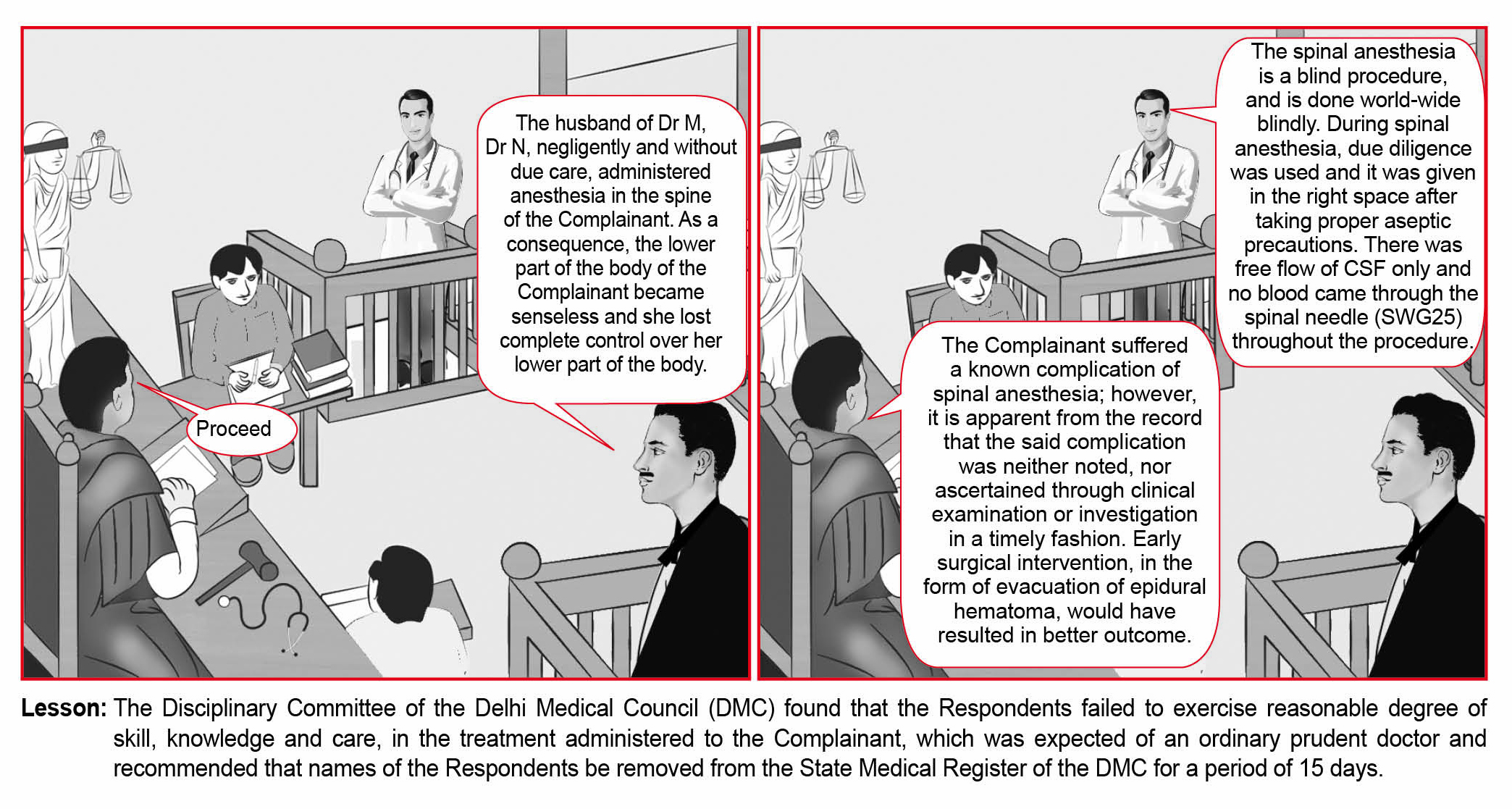Complication of a Procedure
Course of Events
28.11.2008: The Complainant was admitted for delivery in Nursing Home A under Dr M, as she had been under her care during prenatal period. The Complainant was rushed into the operation theater on 28th November, 2008 in hurry by creating panic situation stating that the baby had passed stools.
Allegations of Complainant
In the operation theater, the husband of Dr M, Dr N, who is posted in a Government Hospital, negligently and without due care, administered anesthesia in the spine of the Complainant. As a consequence, the lower part of the body of the Complainant became senseless and she lost complete control over her lower part of the body.
The baby was delivered but the Complainant could not recover from the ailment caused to her on account of professional negligence on the part of Dr M and Dr N.
The Complainant was constrained to consult various experts to get herself examined and magnetic resonance imaging (MRI) report clearly shows that the anesthesia was wrongly administered leading to the said ailment, which completely immobilized the Complainant and she has been confined to bed for almost 2½ years. It was further alleged by the Complainant that Dr N is employed with Government Hospital and has been carrying out the private practice in unauthorized and illegal manner. The Respondents did not render any medical help to the Complainant after she developed the above said problem on account of negligence on the part of the Respondents.
The Respondents did not disclose/inform the Complainant or her relatives regarding the nature of the ailment, which afflicted the Complainant after administration of said anesthesia. The Respondents have neglected the Complainant and willfully committed an act of negligence, which has led to immobilization of the Complainant.
Rejoinder of Respondents
Dr M, the Respondent stated that an absolute emergency and life-threatening condition for the Complainant had developed as the membranes had ruptured spontaneously and fetus had passed the stool (meconium) inside. There was immediate threat to the baby aspirating the meconium-stained liquor in mouth and lungs, which could have been fatal for the baby.
The anesthetist on the call was contacted telephonically and since he was busy in another operation and would be available after approximately
2 hours, another anesthetist was contacted but his mobile did not connect after repeated attempts.
It was only after failure to contact the anesthetist despite repeated attempts that Dr N was contacted in this emergency situation. On being apprised of the emergency situation and the danger to the baby, Dr N agreed with great reluctance only on moral and humanitarian grounds in the best interest of both, the Complainant and her to be born baby.
Dr N, the Respondent stated that the spinal anesthesia was given after taking due care and attention. During spinal anesthesia, due diligence was used and it was given in the right space after taking proper aseptic precautions. There was free flow of cerebrospinal fluid (CSF) only and no blood came through the spinal needle (SWG25) throughout the procedure. As for the loss of control over the lower part of the body is concerned, it is an unfortunate and an isolated incident for which they cannot be blamed.
The Respondents arranged for the urgent and immediate MRI themselves, as soon as they noticed the complication. The MRI scan showed epidural hematoma and spina bifida. The spina bifida is a congenital anatomical defect about which the Complainant did not tell them. The presence of such defect in the spine cannot be ascertained beforehand, before giving spinal anesthesia especially in pregnant women or before starting surgery. They cannot be blamed for such congenital defect in the spine.
MRI report also does not mention about any neurological damage committed during the anesthesia procedure. The epidural hematoma in the MRI scan could not be due to the abnormal arterial venous plexus/arteriovenous malformations present in the epidural space. The spinal anesthesia is a blind procedure, and is done world-wide blindly.
Observations of DMC
The spinal anesthesia is a blind procedure. The Complainant suffered a known complication of spinal anesthesia; however, it is apparent from the record that the said complication was neither noted, nor ascertained through clinical examination or investigation in a timely fashion. The Complainant was administered spinal anesthesia for purposes of delivery on 28th November, 2008. Postoperatively, the Complainant lost complete control over her lower part of the body and complained of acute pain in the spinal region which was attributed to normal pain associated with the procedure and was managed by administering injection voveran, a painkiller.
As per literature, maximum chances of recovery in epidural hematoma (post spinal anesthesia) are within first 8 to 10 hours of injury, a time period which had already elapsed prior to her neurological consultation. It was only on 29th November, 2008 in the morning that the spinal complication was noted and neurological consultation was sought.
The treating team failed to assess the gravity of the clinical condition of the Complainant. When the Complainant was diagnosed as having neurological deficit on 29th morning, it would have been desirable to get an urgent MRI, which would have assisted in confirming the diagnosis and prompted an early surgical intervention in the form of evacuation of epidural hematoma, which would have resulted in better outcome.
As regards, the conduct of Dr N of indulging in private practice, in spite of being in Government service needs to be looked into by the Government.
Order of DMC
In light of the observation made hereinabove, it was the decision of the Disciplinary Committee that the treating team of Dr M and Dr N failed to exercise reasonable degree of skill, knowledge and care in the treatment administered to the Complainant, which was expected of an ordinary prudent doctor. The Disciplinary Committee, therefore, recommended that names of Dr M and Dr N be removed from the State Medical Register of the DMC for a period of 15 days.
Reference
- DMC/DC/F.14/Comp.881/2013/ Dated 23rd July, 2014.
